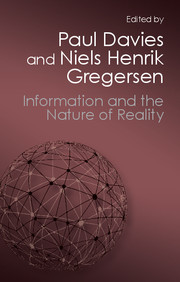1 - Introduction: does information matter?
Published online by Cambridge University Press: 05 June 2014
Summary
It is no longer a secret that inherited notions of matter and the material world have not been able to sustain the revolutionary developments of twentieth-century physics and biology. For centuries Isaac Newton's idea of matter as consisting of ‘solid, massy, hard, impenetrable, and movable particles’ reigned in combination with a strong view of laws of nature that were supposed to prescribe exactly, on the basis of the present physical situation, what was going to happen in the future. This complex of scientific materialism and mechanism was easily amalgamated with common-sense assumptions of solid matter as the bedrock of all reality. In the world view of classical materialism (having its heyday between 1650 and 1900), it was claimed that all physical systems are nothing but collections of inert particles slavishly complying with deterministic laws. Complex systems such as living organisms, societies, and human persons, could, according to this reductionist world view, ultimately be explained in terms of material components and their chemical interactions.
However, the emergence of thermodynamics around 1850 already began to cast doubt on the universal scope of determinism. Without initially questioning the inherited concepts of corpuscular matter and mechanism, it turned out that the physics of fluids and gases in thermodynamically open systems can be tackled, from a practical point of view, only by using statistical methods; the aim of tracking individual molecules had to be abandoned. In what has been aptly called The Probabilistic Revolution (Krüger, Daston, and Heidelberger, 1990), determinism became a matter of metaphysical belief rather than a scientifically substantiated position. By the 1870s a great physicist such as James Clerk Maxwell was already questioning the assumption of determinism by pointing to highly unstable systems in which infinitesimal variations in initial conditions lead to large and irreversible effects (later to become a central feature of chaos theory). It was not until the twentieth century, however, that the importance of non-equilibrium dissipative structures in thermodynamics led scientists such as Ilya Prigogine (1996) to formulate a more general attack on the assumptions of reversibility and scientific determinism.
- Type
- Chapter
- Information
- Information and the Nature of RealityFrom Physics to Metaphysics, pp. 1 - 12Publisher: Cambridge University PressPrint publication year: 2014

